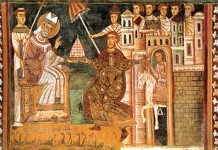There have been two tragic and public suicides in the news of late, which I have picked up on these pilgrimage travels, praying for the souls of the departed: Oksana Shochka, a member both of ‘Pussy Riot’, a musical band, of sorts, as well as ‘Femin’, a feminine group, again, of sorts. The former were famous for protesting Putin by wearing balaclavas and singing pop songs; while the latter were famous for protesting Putin by going topless, often with slogans painted on their bodies. Besides Putin, whom one may protest at will, they also had a grudge against the Church and various other ‘patriarchal’ entities.
Ms. Schochko was but 31, her delicate features apparently yet largely unravaged by time and the other travails of life; but perhaps she saw what was before her, that all flesh is as the flower of the field.
I read that Oksana as a young woman wanted to become a nun, a Carmelite if memory serves, and I could not help thinking, well, how tragic is that? A vocation ruined by the allure of the world, or by circumstances to some extent beyond her control? What might have been in such a sad life? Feminism, at least of the more protesting and radical variety, is by and large an empty, sterile cause, figuratively and all-too-often literally.
May Our Lady of Carmel pray for her, and for all young woman who may be called, but for whatever reason follow not.
The other suicide, alas, was Rick Gensen, ‘Zombie Boy’, who had tattoos over most of his body, and whose primary fifteen minutes of fame was appearing in a Lady Gaga video (remember her?). I used his skeletal-esque visage in an early post, arguing that tattoos are a bad idea, signifying some level of unease and restlessness in the souls of those who pay others to permanently scar their skin with ink.
I know not much of Mr. Gensen, a year or so older than Oskana, nor if, perhaps, there was a higher calling in a past that, again for whatever reason, he did not or could not follow, beyond ‘being tattooed’, but here’s hoping that he too in some way found peace with God, in the midst of a troubled life.
There have been a spate of famous suicides of late, the tip of the iceberg, for there are thousands of uknown souls who end it all, or at least attept to, forgotten so quickly, and the preciptous rise in attempted self-extinction (for the soul will live beyond the body, regardless of what we do), especially amongst certain demographic groups (males 20 to middle age are particularly susceptible). Just wait until ‘euthanasia’ becomes commonplace and expected, and the fragile form of this world falls apart, or, more likely, both.
Albert Camus famously (or infamously) declared that the only question one must ultimately ask is whether or not to commit suicide. At some point in life, we must, or are forced to, ponder the ‘point of it all’, and the only answer is God, or, to unpack that a bit more, our eternal beatitude with Him, which we achieve through following HIs commands, even His inspirations, in this life. Only thus will we achieve that peace of soul of which the saints write and speak, the pearl of great price, for which we should sell, even give away, everything else.
By ‘selling everything’, Christ means doing His will, loving God and our neighbour, producing the fruit of a well-lived life. But we must have a purpopse or end to do so, that ‘master of our affections’ that goes beyond our fickle and transitory feelings, even the needs of our body, and even this temporal life itself. As Pope Benedict pointed out in his encyclical Spe Salvi, the foundation of our hope must not be on the things of this world, but the next or, more precisely, the transcendent.
Bishop Fulton Sheen saw the despair seeping into America decades ago, ironically (or not) in the midst of growing affluence. His immensely popular television program, which, hard now to believe, had the good prelate explaining theology, writing on a chalkboard. The show was simply called ‘Life is Worth Living’.
Such may not always seem so from our limited perspective (which Saint Padre Pio described as the tangled back-end of a beautiful tapestry that God is weaving, but only He can fully see), but we must fight on to the end, trusting in God that, as Blessed Julian of Norwich declared, who lived not far from where I am writing this now that I think of it, ‘all manner of things shall be well’. That is the promise, if we but persevere to the end.











